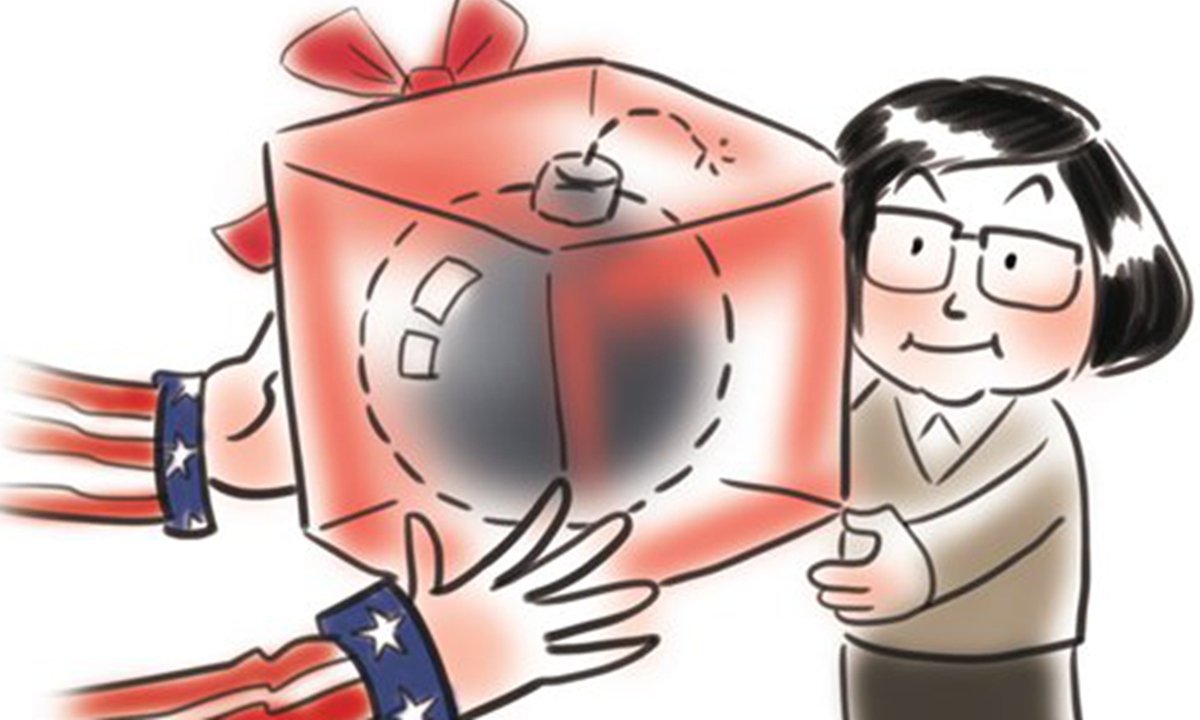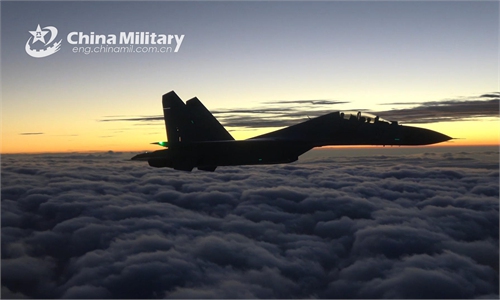US meddling in cross-Straits unification a destabilizing artificiality driven by politics, greed

US arms sales to Taiwan Illustration: Liu Rui/GT
After President Joe Biden tried to test China's bottom line over the Taiwan question by saying that the US would intervene militarily if China were to attack the island, US Senator Tammy Duckworth arrived in Taiwan on Monday for a three-day visit, fueling tensions across the Straits.From time to time, politicians of Western countries have sought to mingle the Russia-Ukraine conflict with China's Taiwan question to muddle the water and mislead public perception. Every situation is different and both Ukraine and Taiwan island have distinctive histories and contemporary contexts.
Absent any skewed foreign perspectives, Chinese mainland and Taiwan island are in a paused civil war that awaits final resolution. In the case of Russia and Ukraine, they share a common East Slavic cultural identity, they were unified in Kievan Rus and more recently they were unified in the sovereign nation of the Soviet Union.
If there were no outside influence and intervention by foreign powers the outcomes would have long been decided by rational leaders cognizant of the military power disparities. Unification would be a foregone conclusion. Absent outside, artificial influence and intervention by meddling foreign powers, the outcomes in both cases would be decided peacefully.
But today artificial foreign influences undermine rationality in both cases delaying rational organic resolutions. A US-driven liberal democratic Western consensus forms an echo chamber that ignores the balance of power realities and rejects discomforting alternative views.
The continuous flow of US conventional weaponry to Ukraine's people and its ever-televised leader provides false hope of achieving a favorable military outcome against Russia. All the while the near certainty that Russia's strategic weapons will ultimately reverse conventional setbacks is dismissed. Absent an end to artificial foreign meddling and the unrealistic Ukrainian self-narrative that it fuels the conflict is trending toward to unrestricted war with NATO. The US defense industry and its significant influence over US Government and NATO decision making is encouraging escalation in the background.
Similarly, the danger that American interference in China's sovereign internal affairs could eventually trigger unrestricted war between China and the US is clear. The political unification of One China is the core national security interest of the People's Republic of China. US military meddling in that unification introduces a destabilizing artificiality into an otherwise organic civil war resolution. As with Ukraine, substantial US arms merchant profiteering will prolong civil war bloodshed even though the unification outcome is known in advance. Likewise, a more determined US military intervention will trigger the employment of strategic weapons. One China unification is the uncompromising core interest of PRC as it threatens China's very national identity and existence.
Yet it is prolonged conventional conflicts that generate the greatest profits for the US defense industry. Their resulting influence over US foreign policy decision making is arguably dangerous as the incentives to fight favor industry interests over the public interest. In the past, ethics regulations discouraged retiring Generals and Admirals from immediately drawing salaries as defense industry board members. Rules also once barred these officers-turned-arms merchants from returning as department of defense decision makers for obvious reasons.
But through the bribes of campaign contributions an increasing number of Members of Congress have a material stake in defense industry success. Responsible Congressional oversight has been corrupted. In its absence a modern spoils system permits the President's own ethics program to grant waivers in cases of conflicts of interest. The President's unelected sycophants clear the appointments of potentially conflicted Flag Officers, if they help the President's agenda.
For example, retired Generals on the payrolls of General Dynamics and Raytheon, both major suppliers of weapons to Taiwan Island and Ukraine, were recently appointed by Presidents and effortlessly cleared to serve as Secretaries of Defense. These same individuals advise Presidents and brief the Congress on the advisability of US involvement in foreign wars. Again, the momentum is tending towards the worst-case outcomes. The decisions of conflicted US policymakers will likely be corrupted to favor war in the case of Taiwan even when such war is not in the public or global interest.
The author is a retired Marine Corps infantry officer and a former Pentagon employee. Opinions are of the author and do not represent the US government. opinion@globaltimes.com.cn



